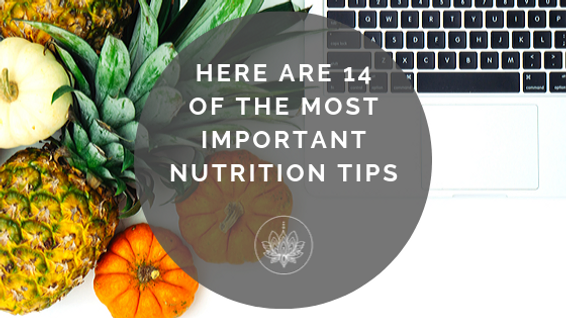You’ve probably heard some of these before. But, then again, there may be some you haven’t. In any case, if there ever were a time you wanted to check up on your health and have all the info in one place, here you have it.
Let’s start by saying that the foundation to a healthy diet is to maintain the right food quantity versus energy output balance. Also, to ensure that you are consuming a wide variety of foods, thereby gaining all the necessary nutrients. If you really want to break it down, studies recommend that men should consume approximately 2,500 calories a day, while women should consume approximately 2,000 calories per day.
Now that you have the basis, here are – in no particular order – 14 expert health and nutrition tips that we at Mind and Body Counseling Associates, Reno, Nevada have put together for you.
#1 Consume Nuts
Not a big nut fan? Well, try changing that and incorporating some nuts into your diet. Although they are said to be high in fat, nuts remain largely nutritious. They are packed with magnesium, vitamin E, fibre, and more!
#2 Avoid Junk Food
Stating the obvious? Nevertheless, it needs to be said. Processed junk food is really bad for you. In fact, it has been created in such a way so as to trigger your pleasure centres, causing you to want to consume more and more. Normally, they are low in fibre, protein, and micronutrients, but high in harmful ingredients such as added sugar and refined grains.
#3 Coffee is Ok
Despite what you may have previously read, coffee is actually healthy for you. It’s high in antioxidants and has been associated with longevity, as well as a decreased risk in Type 2 Diabetes, Parkinson’s and Alzheimer’s disease.
#4 Increase Your Fish Intake
Fish is a fantastic source of high-quality protein and wholesome fat. Especially fatty fish, such as salmon, which is packed with omega-3 fatty acids and many other nutrients. Studies have revealed that those who consume at least two portions of fish, per week, have a decreased risk of contracting heart disease, dementia, and depression.
#5 A Healthy Gut Makes All the Difference
The bacteria located in your gut, known as gut microbiota, are vital for general health and well-being. Issues with gut microbiota are associated with some of the most serious chronic diseases, including obesity. Methods to improve the health of your gut include increasing your intake of probiotics and fibre. Continue on to the next point for more on the latter.
#6 Construct Your Meals Around High Fibre Carbohydrates
Again, despite what you may have previously read about starchy carbohydrates, they should constitute over a third of your diet. This includes potatoes, bread, rice, pasta, and cereals – albeit the wholewheat kind.
Where people tend to get confused, when it comes to carbohydrates, is the refined carbs. Those are the unhealthy ones, which are somewhat lacking in nutrients.
#7 Drink Water, Drink Water, Drink Water
Drinking a sufficient amount of water is hugely beneficial to your health. What’s more, the best time to drink water is just before consuming food, as it increases your metabolism and can, therefore, aid in burning calories. It is recommended that you drink between six to eight glasses of water per day.
#8 Eat Your Vegetable and Fruits
There’s a reason why this gets included in every ‘how to be healthy’ list. Fruits and vegetables are packed with prebiotic fibre, vitamins, minerals, and lots of antioxidants. Consuming at least five portions of fruit and vegetables, daily, has been associated with longevity as well as a decreased risk of heart disease, Type 2 Diabetes, and obesity.
#9 Consume Enough Protein
Another must is ensuring you consume a sufficient amount of protein. High protein consumption has been found to notably boost your metabolism, while simultaneously making you feel full. It has also been found to decrease blood sugar and blood pressure levels.
#10 Cook with Extra Virgin Olive Oil
Extra virgin olive oil is one of the most wholesome vegetable oils. It’s packed with heart-healthy monounsaturated fats and robust antioxidants to help fight inflammation.
#11 Decrease Sugar Consumption
Added sugar is one of the biggest issues with contemporary diets, as an overconsumption can be harmful to your metabolism. What’s more, high sugar intake is associated with obesity, Type 2 Diabetes, heart disease, tooth decay, and various types of cancer. Sugary drinks are, in fact, the worst culprit when it comes to added sugar.
#12 Understand the Difference Between Saturated Fat and Trans Fat
Another somewhat controversial topic. While it has been said that saturated fat increases cholesterol, it also increases HDL (good) cholesterol and decreases LDL (bad) particles. Nonetheless, experts recommend men should not have more than 30g of saturated fat per day, while women should consume no more than 20g per day.
Artificial trans fats, on the other hand, are the unhealthy kind. These are man-made fats, which have strong associations with inflammation and heart disease.
#13 Use Lots of Herbs and Spices
Herbs and spices have lots of great nutrients and healthy qualities. Ginger and turmeric, for example, both contain great anti-inflammatory and antioxidant powers. As such, cook with as many herbs and spices as possible!
#14 Consume Less Salt
While we are all for herbs and spices, we want to caution with the salt. Experts recommend that adults should consume no more than 6g per day, as too much salt has a tendency to raise your blood pressure. This can be tricky, however, when many of the foods you consume already have salt included. Check the labels to be sure.


